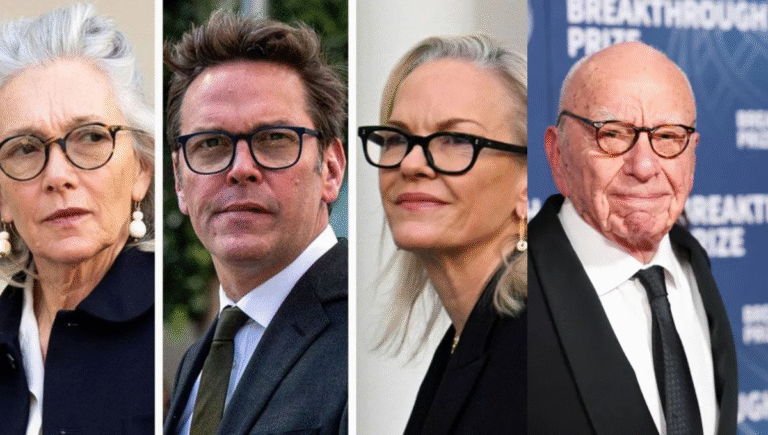After years of speculation and internal rivalry over the future of their empire, the Murdoch family—long regarded as one of the most influential forces in global media—has now reached a decisive agreement of their vast media empire. The agreement marks the end of a long and often dramatic succession saga that has drawn comparisons to television dramas like Succession and has kept both the business and political worlds watching closely.
The Murdoch Empire at a Glance
The Murdoch empire stretches across the globe, commanding a collection of some of the most influential and well-known media organizations. Through News Corp and Fox Corporation, Rupert Murdoch built a portfolio that spans newspapers such as The Wall Street Journal and The Times of London, as well as broadcasting powerhouses like Fox News, Sky (formerly), and HarperCollins.
At its peak, Murdoch’s influence was unrivaled. Politicians courted his approval, media markets were shaped by his decisions, and his business strategies redefined global journalism. Yet beneath the global dominance of the Murdoch empire remained an unanswered question: who would inherit leadership after Rupert Murdoch stepped away?
The Succession Battle
For years, Rupert Murdoch’s children—Lachlan, James, Elisabeth, and Prudence—have been the focus of speculation over who might inherit his vast media empire. Each brought their own style, vision, and ideological leanings to the table:
-
Lachlan Murdoch has often been described as the heir apparent, closely aligned with Rupert’s conservative editorial stance and chosen as co-chairman of Fox Corporation.
-
James Murdoch, in contrast, is more progressive, distancing himself from Fox’s political direction and focusing on independent ventures and philanthropic initiatives.
-
Elisabeth Murdoch carved her own path in television production and independent media, choosing to stay clear of the intense boardroom rivalries that defined her family’s empire.
-
Prudence Murdoch, the eldest, has been more private but still plays an important role in family discussions.
Tensions between the siblings, particularly between Lachlan and James, have long fueled headlines. The ideological divide between them mirrored broader political divides across the Western world, making the family’s feud more than just a business story—it was a cultural one too.
The Deal That Changed Everything
The newly reached succession deal finally sets out a clear structure for the future of the Murdoch empire. Although the full terms have not been disclosed, those close to the matter indicate that:
-
Lachlan Murdoch is set to retain his position at the helm of Fox Corporation, continuing to manage its daily operations.
-
James Murdoch will not hold executive power within the core empire but has secured freedom to grow his own ventures and influence through independent projects.
-
Elisabeth and Prudence are expected to hold financial interests and offer advisory input, though they will not take on executive control.
This arrangement provides stability for shareholders, employees, and the media industry at large, ending years of uncertainty about potential leadership shifts.
Why It Matters
The Murdoch succession battle was never just about who signed the checks or chaired the boardroom—it was about the future of global media. The ideological split between conservative and liberal approaches to news mirrored larger societal divides. Settling this feud ensures continuity but also signals how power will be distributed in shaping public discourse in years to come.
For years, analysts, regulators, and industry competitors questioned whether family disputes might push the Murdoch empire toward breaking apart or selling key assets. With this deal, the likelihood of fragmentation appears reduced, at least in the short term.
Reactions to the Agreement
Industry analysts describe the deal as “the closing of one chapter and the cautious opening of another.” Some see it as a stabilizing moment that secures Rupert Murdoch’s legacy and ensures his preferred vision for Fox News continues under Lachlan’s leadership. Others, however, worry that the settlement could sideline progressive voices within the family, especially James, who has publicly criticized Fox’s editorial direction in recent years.
Employees within the empire may welcome clarity after years of uncertainty, while competitors will watch closely to see how the balance of power shifts in the coming decade.
Looking Ahead
Though the succession battle has ended, questions remain about the long-term survival of traditional media giants in an age of streaming, digital platforms, and rapidly changing news consumption habits. The Murdoch family may have secured internal peace, but external pressures on the empire—from regulatory challenges to competition with tech giants—are likely to intensify.
For Rupert Murdoch, who transformed a single Australian newspaper into a global powerhouse, the succession deal may be the final legacy-defining move of his career. For the rest of the world, it is a reminder that even in an era dominated by technology, family dynasties still shape the media narratives that influence politics, culture, and society at large.
